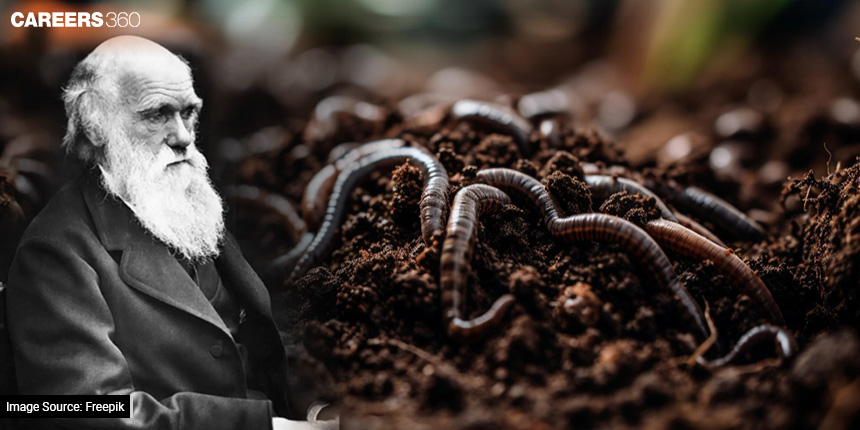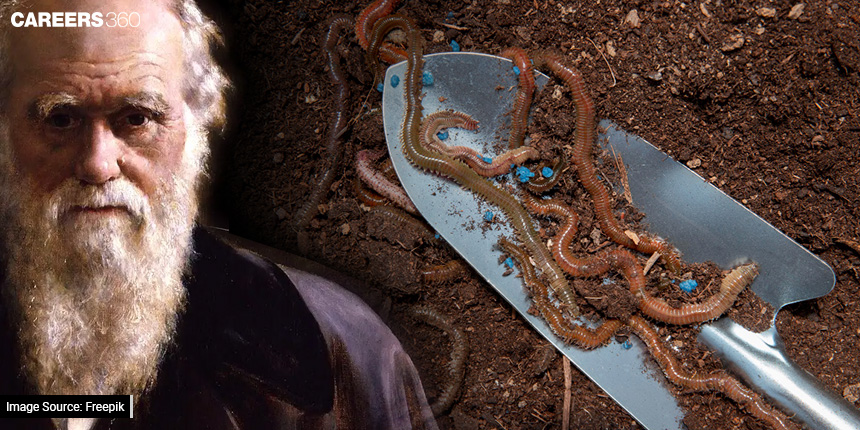Darwin’s Research On Worms: Tiniest But Rather Important Creatures
Creatures around the world have different roles in the environment. All creatures are a part of the ecosystem, and therefore every organism, be it the tiniest, strongest, largest, or dirtiest, has its own role in nature. Today, let’s talk about one of them: The Worms!
This Story also Contains
- Importance Of Worms
- What Will Happen Without Earthworms?
- Great Food Source
- Charles Darwin’s Research on Worms
- Vermicompost

Worms may seem creepy and useless to many people, but these lowly, organised creatures with fantastic burrowing abilities inhabit the soil. They play an extremely important role in fabricating the soil and are hence also known as the engineers of the underworld. These tiny crawlies offer free farm help and have been believed to be more important than any other organism in history. But why is that so? How come earthworms are so essential to the Earth and life?
Importance Of Worms
Worms are found in the soil and help in its mixing by creating tunnels through their penetration. Along with this, some other necessary functions are listed below:
Nutrient Recyclers
Do you know worms can eat an amount equal to their body weight? These hungry crawlies feed on dead organisms and plants, fallen leaves, waste organisms, and other microbes present in the soil. Feeding on these substances will release nutrients and other organic matter in the soil that enhance the overall quality and nutrition of the soil.
The organic matter formed within the soil helps fertilise it naturally. Apart from worms, do you know that worm poo is also beneficial? The worm poo, known as worm castings, is generally found on the top of the soil and contains higher nitrogen, phosphorus, and good bacteria.
Improvement In Soil Quality
Worms can improve soil quality better than chemical fertilisers or any other artificial supplements by just forming burrow channels. While moving, it creates small spaces and loosens the soil, thereby increasing oxygenation and water movement.
The complete absence of worms from the soil can make them 90 per cent less effective as oxygen and water movements will be impacted. This will ultimately make the soil less fertilised and impact the vegetation. Apart from this, water absorption will not occur, so the water run-off will be higher, leading to flooding and soil erosion.
Damaged Soil Repair
Worms can help clean up the waste from the contaminated land by increasing the activity of microbes and thus promoting bioremediation. This is the process by which microbes break down pollutants to convert them into less toxic chemicals.
Worms move through the soil, and their wriggling motion mixes the soil, thereby distributing the microbes and enhancing bioremediation.
So, these tiny and dirty creatures clean up the soil fairly well and are hence crucial for the soil's and the environment's health.
Also, Read | Gene-Edited Foods And GMOs Latest Update, And Their Strict Regulation
What Will Happen Without Earthworms?
As for soil health, we already know how important earthworms are. They also help in providing nutrients to other organisms, so good soil health is unimaginable without worms. If worms were to become endangered or extinct, the exact implication cannot be stated, but it will definitely have a damaging effect on the soil.
Since soil is one of the most important factors, vegetation and other organisms’ survival will be impacted as well.
Great Food Source
Worms are an excellent source of various nutrients, mainly proteins. Birds, foxes, and other animals feed on worms, thus serving as a great food source.
Charles Darwin’s Research on Worms
 Charles Darwin spent a good 39 years researching these tiny, ugly crawlies. Darwin discovered that the most effective way to pull in leaves is by the tips. Darwin discovered that during their meanderings, worms actually move the earth. Their movement through the ground aerates the soil, and the natural chemistry of their digestive tracts transforms plant and soil material into fertile pellets.
Charles Darwin spent a good 39 years researching these tiny, ugly crawlies. Darwin discovered that the most effective way to pull in leaves is by the tips. Darwin discovered that during their meanderings, worms actually move the earth. Their movement through the ground aerates the soil, and the natural chemistry of their digestive tracts transforms plant and soil material into fertile pellets.
Based on his studies, earthworms were considered more influential than dinosaurs and humans in history. The reason is their involvement in promoting and maintaining soil health, which further impacted the growth of plants and animals, directly or indirectly.
Worms are accountable for ecosystem services, and hence their conservation was stated to be more important than that of any other animal. These keystone species and their importance cannot be overlooked, as human survival is impossible in the long run without worms.
Vermicompost
A type of compost formed mainly by using worm castings was shown to increase crop yields considerably when compared to standard fertiliser. Production of vermicompost industrially is not an easy task and may also create holes in the pocket, due to which vermicompost is always expensive as compared to other commercial fertilisers.
The worm’s casts have five times more nitrogen, seven times more phosphorus, and 1000 times more bacteria than natural soil, thus making them a more suitable fertiliser than others. It has vital nutrients and helps the plant thrive.
Conclusively, earthworms are tiny and creepy, but their importance cannot be overlooked. Known by different labels like soil engineers, underground scientists or allies, ecosystem service providers, or keystone species, worms simply fertilise the soil naturally by wriggling, pooping, and eating the waste.
These dirty creatures may never receive a "cute response," but standard attention to their work and cleaning must be given as the increasing use of artificial fertilisers is declining the earthworm population.
Also, Read | Most Deadly Epidemics And Pandemics In The Past And Scenario In The Present
Applications for Admissions are open.
As per latest syllabus. Physics formulas, equations, & laws of class 11 & 12th chapters
JEE Main Important Chemistry formulas
Get nowAs per latest syllabus. Chemistry formulas, equations, & laws of class 11 & 12th chapters
JEE Main high scoring chapters and topics
Get nowAs per latest 2024 syllabus. Study 40% syllabus and score upto 100% marks in JEE
JEE Main Important Mathematics Formulas
Get nowAs per latest syllabus. Maths formulas, equations, & theorems of class 11 & 12th chapters
